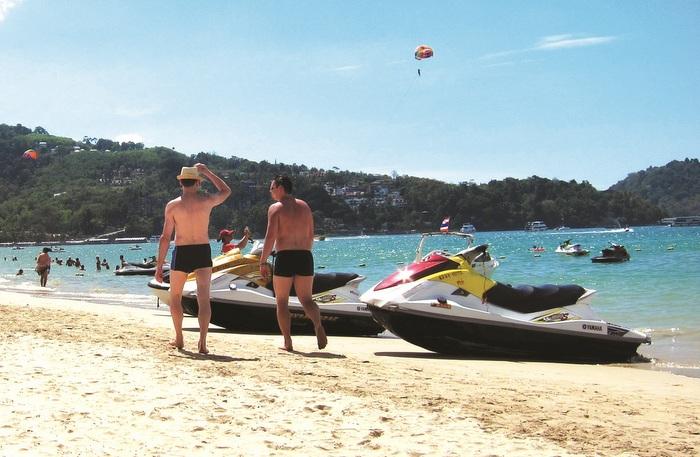On Deck: The case for in-water zones

PHUKET: Phuket’s ten per cent beach rule and the issue of beach and sea zoning has received a lot of attention recently and yet here we are mid high season and it’s easy to see the problems haven’t been fixed.
Head down to Patong Beach any day of the week and you will see roped off swim areas. You might actually have to look a little harder than expected as the non-roped off areas cover much more space and these are set aside for jet skis, parasails and such. Essentially, they’re non-swim zones, although the authorities would likely prefer they were not labelled as such.
A few years ago I was in Boracay – a stunning island in the Philippines popular with tourists from all corners of the world. I was there for a windsurfing event on White Beach and what amazed me most was the organization of the beach. I don’t mean Singapore-esque organization, but a simple and effective way of organizing beach use locally, that seemed – to me at least – to work.
There was no smoking on the beach and this was reinforced by no smoking signs everywhere. I hear some saying “but we have that in Phuket”. No, you don’t. Walk along any of the main beaches and see the cigarette butts in the sand. This does not happen in Boracay.
All the resorts were separated from the beach by a sand or dirt path. During the day, on the beach side of this path there were temporary stalls selling everything from textiles, trinkets, knick-knacks, drinks and snacks.
Come early evening, these all packed up and moved out, and restaurants were set up. Some restaurants were extensions of the resorts and others were stand-alone. They were right on the beach, exactly what tourists wanted.
The system was apparently managed by the local authority. People followed the rules and everything was kept clean. Simply put, it worked. It worked for the local businesses and the tourists. And the beaches remained spotless.
I was blown away by this and still don’t understand why Phuket cannot come up with a sensible, workable approach.
For the windsurfing event I was at on White Beach we set marquees up on the beach and we had to get permission to do that, and pay for a permit. The permit allowed us to use that space only between certain times. Similarly, we had to get permission for the windsurfers and speedboats used for race management and media to access the beach, and again we had to purchase a permit which stipulated the hours we were allowed for use. This meant we had to finish racing by a certain time, so all the water craft could get back to the beach before the validity of our permit ran out.
Sounds harsh? Not at all. It was very successful. There was even on-water support from the local authority keeping other boats and swimmers away from the area we were using thereby ensuring the safety of the other people using the area.
Something else I noticed in Boracay was that catamarans, parasails, jet-skis and speedboats all used the beach too. There were three set stations on the beach where they were based. Tourists had to walk along the beach to these stations to get on the craft and the craft could only leave the beach from those points. They would then head straight out to sea to avoid swimmers; after which they could have fun. All craft would then have to return to the same station on the beach.
A simple and effective system. There was no need for swim areas as swimmers could swim anywhere they liked and it was obvious to swimmers they didn’t want to swim near the three watersports stations, and as they took up probably less than ten per cent of the whole beach.
I haven’t been to Boracay since that trip, but perhaps Phuket and Thailand’s authorities should. There are examples around of how to effectively manage beaches for multiple users, and Phuket can learn from nearby countries and finally create an effective system.
It’s really not that hard.
Duncan Worthington is a long time Phuket resident and through Infinity Communications (www.infinity-comms.com) consults to leading consumer brands, hospitality and marine clients in Thailand. In his ‘spare time’ he runs the marine portal www.MarineScene.asia. #OnDeckPhuket
— Duncan Worthington
Latest Thailand News
Follow The Thaiger on Google News:


























